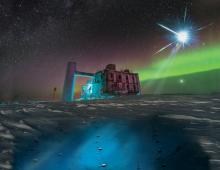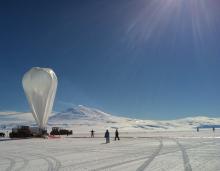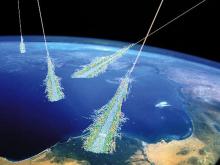Listen to today's episode of StarDate on the web the same day it airs in high-quality streaming audio without any extra ads or announcements. Choose a $8 one-month pass, or listen every day for a year for just $30.
You are here
Explosive Change
Being too close to an exploding star can spoil your day. But being just close enough could make your day. A study a couple of years ago, for example, suggested that nearby exploding stars could have sped up the evolution of human ancestors.
Several massive stars within a couple of hundred light-years of Earth have exploded as supernovas over the last few million years. They’ve created a huge bubble of hot but thin gas around us, known as the Local Bubble.
The remnants of these stars produce huge amounts of cosmic rays — particles accelerated to almost the speed of light. They zip through the Local Bubble, pelting the stars and planets inside it. When they hit Earth, they give the atmosphere a stronger electric charge.
According to the study, that could result in more lightning bolts hitting the surface, starting more wildfires. And there’s evidence of more soot in the atmosphere starting about seven million years ago, and peaking a few million years later. Combined with other evidence, that supports the idea both of nearby supernovas and of increased wildfires.
The wildfires would have consumed forests in parts of the world, converting them to grasslands. And that could have been one factor that led human ancestors to begin walking on two legs.
Scientists continue to study supernovas in our neighborhood to learn more about their impact on Earth and its life — the possible influence of exploding stars.
Script by Damond Benningfield





